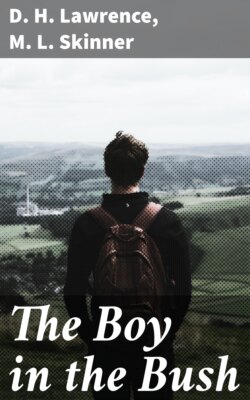Читать книгу The Boy in the Bush - D. H. Lawrence - Страница 14
На сайте Литреса книга снята с продажи.
CHAPTER IV WANDOO I
ОглавлениеTwo things struggled in Jack's mind when he awoke in the morning. The first was the brave idea that he had left everything behind, that he had done with his boyhood and was going to enter into his own. The second was a noise of somebody quoting Latin and clicking wooden dumb-bells.
Jack opened his eyes. There were four beds in the cubby hole. Between two beds stood a thin boy of about thirteen, swinging dumb-bells, and facing two small urchins who were faithfully imitating him, except that they did not repeat the Latin tags. They were all dressed in short breeches loosely held up by braces, and under-vests.
Veni! up went their arms smartly,—vidi! down came the dubs to horizontal,—vici! the clubs were down by their sides.
Jack smiled to himself and dozed again. It was scarcely dawn. He was dimly aware of the rain pattering on the shingle roof.
"Ain't ye gettin' up this morning?"
It was Tom standing contemplating him. The children had run out barefoot and bare-armed in the rain.
"Is it morning?" asked Jack, stretching.
"Not half. We've fed th' osses. Come on."
"Where do I wash?"
"At the pump. Look slippy and get your clothes on. Our men live over at Red's, we have to look sharp in the morning."
Jack looked slippy, and went out to wash in the tin dish by the pump. The rain was abating, but it seemed a damp performance.
By the time he was really awake, the day had come clear. It was a fine morning, the air fresh with the smell of flowering shrubs: silver wattle, spirea, daphne and syringa which Ellis grew in his garden. Already the sun was coming warm.
The house was a low stone building with a few trees round it. But all the life went on here at the back, here where the pump was, and the various yards and wooden out-buildings. There was a vista of open clearing, and a few huge gum-trees. The sky was already blue, a certain mist lay below the great isolated trees.
In the yard a score of motherless lambs were penned, bleating, their silly faces looking up at Jack confidently, expecting the milk bottle. He walked with his hands in the pockets of his old English tweeds, feeling over-dressed and a bit out of place. Cows were tethered to posts or standing loose about the fenced yard, and the half-caste Tim, and Lennie, the dumb-bell boy, and a girl, were silently milking. The heavy, pure silence of the Australian morning.
Jack stood at a little distance. A cat whisked across the yard and ran up a queer-looking pine-tree, a dissipated old cow moved about at random. "Hey you!" shouted Tom impatiently, "Take hoult of that cart toss nosin' his way inter th' chaff-house, and bring him here. An' see to that grey's ropes: she's chewin' 'em free. Look slippy, make yourself useful."
There was a tone of amiability and intimacy mixed with this bossy shouting. Jack ran to the cart toss. He couldn't help liking Tom and the rest. They were so queer and naive, and they seemed oddly forlorn, like waifs lost in this new country. Jack had always had a leaning towards waifs and lost people. They were the only people whose bossing he didn't mind.
The children at their various tasks were singing in shrill, clear voices, with a sort of street-arab abandon. Lennie, the boy, would break the shrilling of the twin urchins with a sudden musical yell, from the side of the cow he was milking. And they seemed to sing anything, songs, poetry, nonsense, anything that came into their heads, like birds singing variously and at random.
"The blue, the fresh, the ever free
I am where I would ever be
With the blue above, and the blue below—"
Then a yell from Lennie by the cows:
"And wherever thus in childhood's our—"
The twins:
"I never was on the dull tame shore
But I loved the great sea more and more—"
Again a sudden and commanding yell from Lennie.
"I never loved a dear gazelle
To glad me with its soft black eye,
But, when it came to know me well
And love me—"
Here the twins, as if hypnotized, howled out—
"—it was sure to die."
They kept up this ragged yelling in the new, soft morning, like lost wild things. Jack laughed to himself. But they were quite serious. The elders were dumb-silent. Only the youngsters made all this noise. Was it a sort of protest against the great silence of the country? Was it their young, lost effort in the noiseless antipodes, whose noiselessness seems like a doom at last? They yelled away like wild little lost things, with an uncanny abandon. It pleased Jack.
